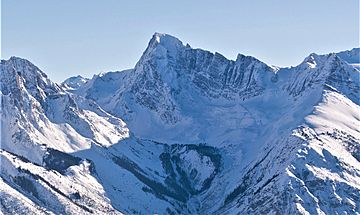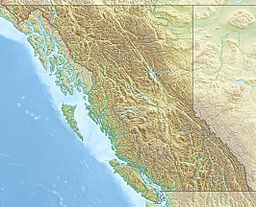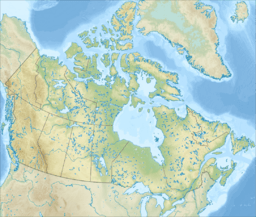Valenciennes Mountain facts for kids
Quick facts for kids Valenciennes Mountain |
|
|---|---|

Northwest aspect in winter
|
|
| Highest point | |
| Elevation | 3,150 m (10,330 ft) |
| Prominence | 1,509 ft (460 m) |
| Isolation | 1.63 mi (2.62 km) |
| Parent peak | Messines Mountain |
| Listing | Mountains of British Columbia |
| Geography | |
| Location | Kootenay Land District British Columbia, Canada |
| Parent range | Canadian Rockies |
| Topo map | NTS 82N/14 |
| Geology | |
| Age of rock | Cambrian |
| Type of rock | sedimentary rock |
| Climbing | |
| First ascent | 1934 |
| Easiest route | Mountaineering |
Valenciennes Mountain is a tall mountain in the Canadian Rockies. It stands 3,150 meters (about 10,330 feet) high. You can find it in British Columbia, Canada. The mountain is near the Valenciennes River. It is also close to the border with Alberta and Banff National Park.
The mountain got its name in 1920. It was named after Valenciennes, a town in France. Canadian soldiers helped capture this town during World War I in 1918. A brave Canadian soldier, Hugh Cairns, even won a special medal called the Victoria Cross there. The first people to climb Valenciennes Mountain reached its top in 1934. They were H. S. Kingman and J. Monroe Thorington, with their guide Rudolph Aemmer.
How Valenciennes Mountain Was Formed
Valenciennes Mountain is made of sedimentary rock. This type of rock forms from layers of sand, mud, and tiny bits of sea creatures. These layers settled at the bottom of ancient, shallow seas. Over millions of years, these layers were pressed together and turned into rock.
Later, during a time called the Laramide orogeny, huge forces pushed these rocks. They were pushed east and even slid over younger rocks. This process slowly lifted the land, forming the mountains we see today.
What's the Climate Like at Valenciennes Mountain?
Valenciennes Mountain has a subarctic climate. This means it has very cold, snowy winters. Its summers are usually mild. Temperatures can drop below −20 °C (which is −4 °F). With the wind chill, it can feel even colder, sometimes below −30 °C (−22 °F).
This cold climate helps keep glaciers on the mountain. You can see them on the northeast and northwest slopes. There is also a large area of ice called the Mons Icefield nearby. Water from melting snow and ice flows into Mons Creek and the Valenciennes River.
 | Shirley Ann Jackson |
 | Garett Morgan |
 | J. Ernest Wilkins Jr. |
 | Elijah McCoy |



